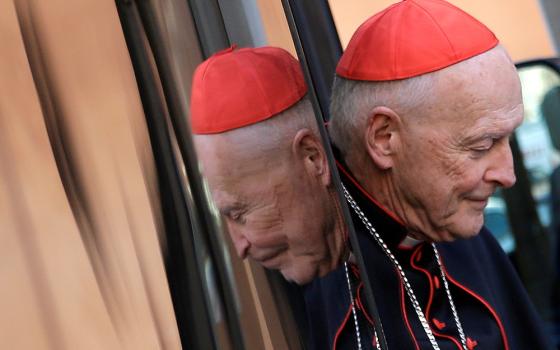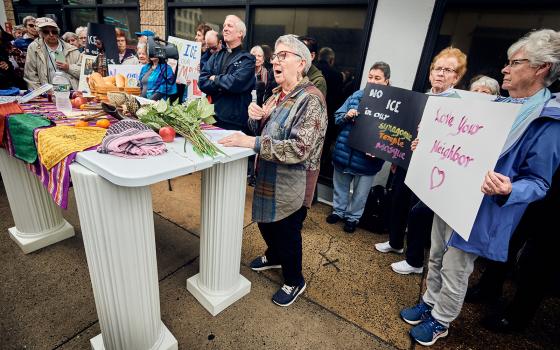Sunday Pope Benedict XVI visited the Great Synagogue of Rome, marking only the second time that a pope has crossed the Tiber River to enter the primary Jewish place of worship in Rome. The event offered a strong signal of commitment to Jewish/Christian dialogue, but also a reminder of the tensions in the relationship – including, most recently, possible sainthood for Pope Pius XII, the wartime pontiff whose alleged “silence” on the Holocaust remains the object of fierce historical debate.
The visit sparked a variety of reactions, ranging from traditionalist Catholics who celebrated a “Mass of reparation” to atone for what they called the “insult” of the pope’s synagogue visit, to prominent rabbis who hailed the pope’s commitment to dialogue and to fighting anti-Semitism.
The following is a sampling of commentary on the day after Benedict’s visit to the synagogue – the third time Benedict has met Jews on their own turf, so to speak, after trips to the Cologne Synagogue in 2005 and the Park East Synagogue in New York in April 2008.
Rabbi Alfonso Arbib, Chief Rabbi of Milan
“The pope’s speech was important, because he confirmed some fundamental concepts – for example the irreversibility of the divine covenant with the Jewish people. That’s an important concept for Catholics, because for several centuries in Catholicism there was the ideology, or the idea, of substitution, that the Catholic church substitutes for the Jewish people.”
A Jewish restaurant owner in Rome (not identified by name on Italian television)
“Before the meeting, everyone was skeptical. Why do we have to have this meeting? What’s the point? Who will benefit from it, and what will it produce? But after the meeting, I have the impression that most of those who were against it changed their mind.”
Organizers of a traditionalist “Mass of reparation” held in Verona
“The premises of the synagogue visit on the part of Benedict XVI do not appear in any way to be in continuity with those of the first pontificate of St. Peter.” The visit “follows in the relativistic footsteps of ‘dialogue’ inaugurated by the Second Vatican Council and beyond, which aims at maintaining non-Catholics in the errors of their respective religions.”
A Jewish woman who took part in the synagogue event (not identified by name on Italian television)
“The silence of Pope Pacelli [Pope Pius XII] hurt us very much. It was correct to talk about that with the pope, because it's what was in all of our hearts."
Giancarlo Zizola, veteran Catholic journalist and Vatican expert
“Many Catholics should be grateful to the Jewish world, because sometimes they can give voice to sources of discontent within the church which the Catholic world isn’t able to express, often for institutional reasons. For example, the penitential attitude of the church with regard to the Shoah, which the dialogue with Judaism keeps alive, makes us better aware of the necessity to integrate our profession of faith as Christians with the actual conduct of members of the church, both at the top and at the base."
Rabbi Giuseppe Laras, President of the Assembly of Italian Rabbis
[Note: Laras chose to boycott the papal visit in protest of what he described as ‘deterioration’ in Jewish/Catholic relations under Pope Benedict XVI]
“In the speech of the pope, we heard several things that are encouraging, important and positive, but also, I would say, largely predictable … The question is whether some new impulse or reinforcement of the dialogue in concrete terms will result from this summit. The danger is exaggerating the importance of the event and undervaluing the real problems in the dialogue.”
“What we have to avoid is that the dialogue is exclusively an affair at the top. It has to make its way down to the base, such as the local parish community. That’s where the success of the dialogue should be measured, and where it can produce better understanding and important steps in the fight against anti-Semitism. Involving famous personalities is important, but they don’t necessarily have the pulse of the real situation. If the pope wants to make a strong contribution to fighting anti-Semitism, then we would expect that he become a motor force for driving this dialogue down to the base.”
Riccardo Pacifici, President of the Jewish Community of Rome
“The most beautiful thing about this event was the sincerity, the truth on all sides. The risk would have been to manufacture a feel-good appointment, full of hypocrisy, pretending that everything is fine. Some said that the Vatican should have waited until after the visit to say anything about Pius XII, but in reality the fact that they did it beforehand allowed us to deal with it with greater clarity. Everything was on the table.”
“Beatification would be seen as a judgment on Pius XII, not just an absolution but a declaration of heroism – not ‘heroic virtue,’ but moral heroism – which in our view wasn’t there. … The moment that struck me more than anything else during the ceremony was when the pontiff stood up and gave a small bow to the [Holocaust] survivors. We owe a huge debt to them … Someone told me a few months ago that the beatification of Pius XII would never happen during the pontificate of Benedict XVI. Perhaps his signature on the decree of heroic virtue was simply a symbolic act, and we can hope that in concrete terms, [the beatification] will not happen, at least until after we have had a chance to consult the archives.”
“The paradox of all this is that since it wasn’t just any pope [who came to the synagogue], but a German pope, it’s possible that he will feel a special responsibility upon his shoulders. Everyone forgets today, but I remember very well that at the beginning, the election of a Polish pope was not viewed with great enthusiasm by Jews, because the Poles were more the accomplices of the Nazis rather than the victims of Nazism. They contributed in an aggressive manner to the final solution. With a few rare exceptions, such as Papa Wojtyla, they didn’t help anybody. Half of the six million Jews who died were Poles, as 98 or 99 percent of them just disappeared. So, we are hoping that Pope Ratzinger will likewise feel a special historical responsibility.”
“I can guarantee that things were said in the corridors, in private, and now we’re waiting to see results – not right away, but eventually. That’s the chance we took. For example, we need a sharper clarification, without any ambiguities, on the Lefebvrites. How is it possible to welcome them into the church when they hold a ‘Mass of reparation’ for the visit to the synagogue?
Bishop Vincenzo Paglia of Terni, President of the Commission for Ecumenism and Dialogue of the Italian bishops
“Yesterday not only confirmed the irreversibility of dialogue between Jews and Christians, but in my opinion, it also pointed the way to important steps forward … Yesterday, de facto, the pope and Rabbi Di Segni commented on the Scriptures together. That’s never been done before together. I saw the emotion in Pope Benedict XVI when Di Segni commented on the verses from Scripture about brotherhood. Knowing Pope Ratzinger very well, when he went to greet the rabbi, I thought it was a way of underlining these passages on brotherhood.”
“This pope knows how to weigh his words, so everyone was keenly awaiting his speech. His words were extraordinary, including a strong confirmation of the critically important concepts of the Second Vatican Council. I convinced that yesterday we began to walk together in a new way, focused more clearly on how we can continue to develop our sense of brotherhood with one another. It was an unforgettable event.”
“What’s important is that we cannot allow ourselves, living in a world like the one in which we find ourselves, to allow our sense of brotherhood and our common commitments to be corroded.”
Philip A. Cunningham, director of the Jewish-Catholic Institute at St. Joseph's University in Philadelphia
"I was struck by how often the pope referred to Jews using the language of covenant, explicitly or implicitly; something which does not appear to have been very frequent earlier in his papacy ... Benedict's words are incompatible with recent efforts by some Catholics to argue that the Mosaic covenant was rendered obsolete or inert by Christ's coming, or that ongoing Jewish covenantal life can somehow be separated from the Torah. The pope could not [speak this way] if he endorsed such 'neo-supersessionist' arguments. It seems to me that those Catholics who like to assert there is a serious Catholic debate over the vitality of Torah covenantal life after Christ would do well to ponder today's papal address."
Fr. Floriano Abrhamowicz, a traditionalist priest who has been excommunicated by the Vatican and expelled by the Society of St. Pius X, the main Lefebvrite body, and who celebrated the “Mass of reparation” on Sunday
“The one missing in all of this is Jesus Christ.”
--------------------------------------------------------------------
Read John Allen's main story on Benedict's visit to the Rome synagogue here: Pope welcomed to Rome synagogue despite tensions



